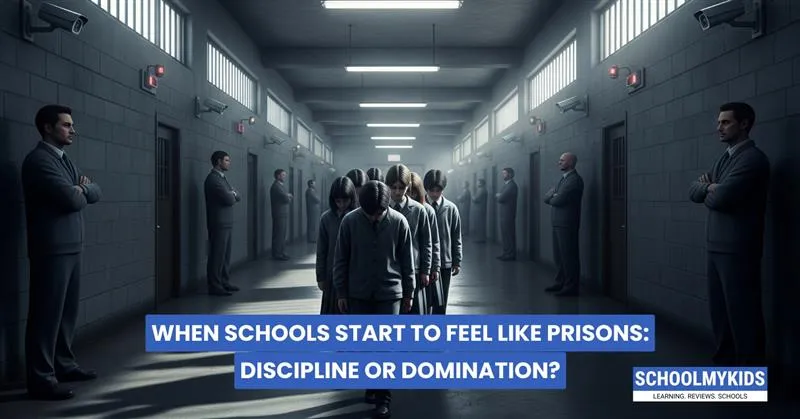Today, let's talk about something that's been bothering students across India for years. Walk into any school and you'll find rules. Lots of them. Don't run in corridors. Don't speak in your mother tongue. Don't bring mobile phones. Don't color your hair. Don't wear fancy jewelry. The list goes on and on.
But when does maintaining discipline cross the line into controlling every breath a kid takes?
The Reality Check
India's schools have always had strict rules. Many of us grew up with them. But something feels different now. The rules have gotten longer, stricter, and suffocating.
Take a look at what's happening today. Schools are implementing rules where students can't enter class if they're even slightly late. Some schools ban correction pens and highlighters in notebooks. Others don't allow students to use the toilets during class time.
In 2024, the Chhattisgarh High Court had to step in on a serious case. A teacher was charged with abetment of suicide after subjecting a child to corporal punishment. The court was clear: "Subjecting a child to corporal punishment for reforming him cannot be a part of education." The judges said such punishment goes against a child's dignity and their right to life under Article 21 of the Constitution.
The Punishment Problem
Despite the Right to Education Act 2009 banning corporal punishment, it's still happening. And not rarely.
According to data compiled by organizations tracking child rights, corporal punishment remains widespread in Indian schools, especially government schools. In 2014, a Delhi survey found that 49.3% of students aged 6-14 said teachers in their schools used corporal punishment. In Greater Hyderabad alone, 583 cases were reported in just January 2014.
The Madras High Court in April 2024 had to direct the Tamil Nadu government to implement guidelines for eliminating corporal punishment in schools. Courts are still fighting to protect kids from being beaten in school.
Beyond Physical Punishment
But discipline isn't just about hitting or caning. It's also about the rules that make school feel like a prison:
- "Perfect silence must be observed when changing classes."
- "Running, playing, shouting inside the school building is never allowed."
- "English must be spoken at all times on school premises."
- Students expelled for "constant weakness in studies" or "habitual idleness."
These aren't made-up examples. These are actual rules from Indian schools right now.
The Mental Health Crisis Nobody Wants to Talk About
India is facing what the Supreme Court called a "suicide epidemic" among students in 2025. Over 13,000 students die by suicide every year in India.
According to a report released in 2024 titled "Student Suicides: An Epidemic Sweeping India," student suicides have been increasing at 4% annually, which is double the rate of overall suicides in the country. Between 2019 and 2023, newspaper reports documented 491 student suicide deaths, with academic pressure, institutional bullying, and toxic school culture being major factors.
In Kota, Rajasthan, India's coaching hub, around 25+ students died by suicide in 2023 alone. These weren't just statistics. These were kids who felt the pressure was too much to handle.
Academic stress now ranks as the most common mental health issue among Indian school children, followed by behavioral problems, anxiety, and depression. Yet most schools don't have proper mental health support. The Supreme Court had to issue 15 guidelines in 2024 mandating schools with 100+ students to hire counselors.
From a Kid's Perspective
Imagine being 14 years old. You're trying to figure out who you are. Your body is changing. Your emotions are all over the place. You want to talk to friends, maybe crack jokes, maybe just be a kid.
But instead, you're sitting ramrod straight in class, scared to even whisper. You can't go to the bathroom because it's not break time. You failed a test and now you're terrified of what your teacher will say, what your parents will say, what your classmates will think. The school might even put you on a "Yellow Card" system, like you're a criminal being tracked.
You're not learning to think critically or explore your interests. You're learning to follow orders and fear punishment.
Does that sound like education? Or does it sound like something else?
Where's the Line?
Nobody's saying schools shouldn't have rules. Of course they should. Kids need structure. They need boundaries. They need to learn respect and responsibility.
But here's what kids also need:
- To be treated with dignity
- To have their voices heard
- To make mistakes without fearing humiliation
- To go to the bathroom when nature calls
- To speak in the language they're comfortable with
- To feel safe, not scared
Discipline should teach kids self-control and responsibility. Domination makes them fearful and stressed.
Discipline prepares kids for life. Domination breaks their spirit.
What Can Change?
The National Education Policy 2020 promised a more holistic, student-friendly approach. It talked about reducing academic burden, promoting extracurricular activities, and focusing on mental well-being. Those are beautiful words on paper.
But on the ground, many schools still operate like they did decades ago. Rigid. Unforgiving. Focused only on marks and ranks.
Some schools are doing it right. They have counselors. They encourage students to speak up. They understand that a child who feels safe learns better than a child who feels afraid.
We need more of those schools.
Conclusion
Students aren't tiny adults who need to be controlled. They're young humans who need guidance.
When a school feels like a prison (with constant surveillance, harsh punishments, and rules that strip away individuality), that's not discipline. That's domination.
Real education happens when students feel safe enough to ask questions, make mistakes, and grow. It doesn't happen when they're walking on eggshells, terrified of breaking some rule they didn't even know existed.
Schools should be places where kids learn to think, not places where they learn to fear.
So the next time someone defends excessive rules by saying "kids need discipline," ask them this: Are we teaching kids to be responsible citizens, or are we just teaching them to be obedient prisoners?
There's a world of difference between the two.








Be the first one to comment on this story.